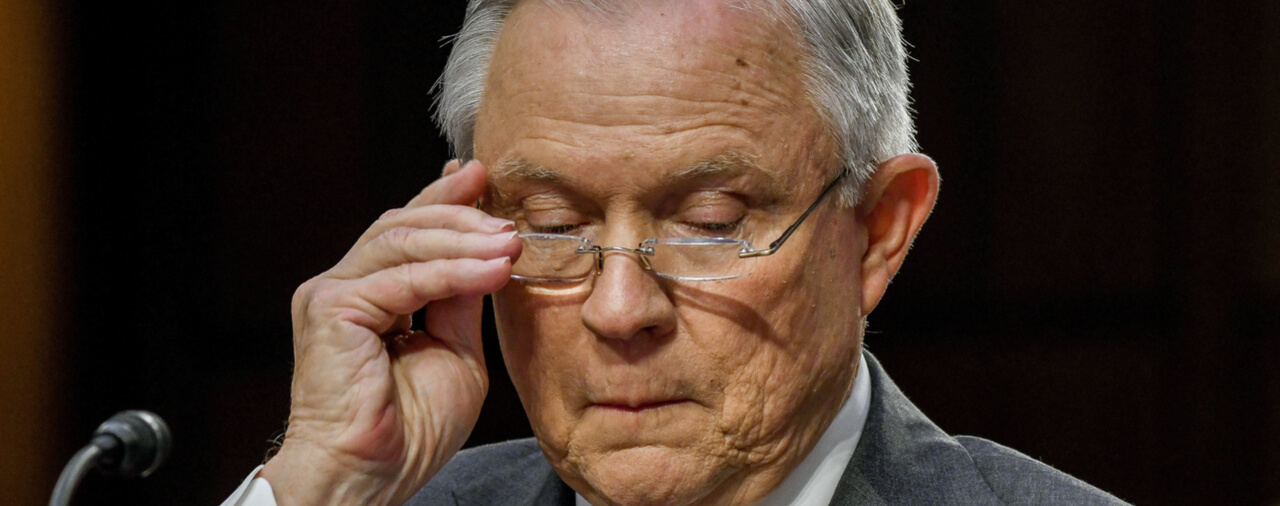Jeff Sessions Resigns as Attorney General
On November 7, 2018, now former U.S. Attorney General Jeff Sessions resigned at the request of President Donald Trump. You may read the former Attorney General’s letter of resignation here [PDF version].
Typically, when the head of an Executive Agency resigns, the second ranking official at the agency takes over. However, upon the resignation of Sessions, President Trump has appointed Matthew Whitaker as the acting Attorney General under the authority of 5 U.S.C. 3345(a)(3) [PDF version] — a provision of the Federal Vacancies Reform Act which allows the President to appoint certain employees of a federal agency to fill a vacancy in an acting capacity.
The change in the Attorney General is a significant event in the context of immigration law. In this article, we will explain the importance of the Attorney General in the immigration context, Jeff Sessions’ legacy as Attorney General on immigration matters, and the background of new Acting Attorney General Matthew Whitaker.
Why is the Attorney General Important in Immigration Law?
The Attorney General is the head of the Department of Justice (DOJ). The DOJ has a broad range of responsibilities and authorities. Some deal directly with immigration law while others relate to immigration law tangentially. Below, we will list some of the ways in which the Attorney General is significant in the immigration context.
The Executive Office for Immigration Review (EOIR) — which includes the immigration courts and the Board of Immigration Appeals (BIA) — is a component of the DOJ. Immigration judges and Board members exercise authority delegated by the Attorney General. The Attorney General has the authority to write regulations for immigration proceedings and to review BIA decisions. The Attorney General may publish his or her own precedent decisions, which are binding on immigration courts and the Board. For example, see our article on one of former Attorney General Sessions’ many published decisions [see article].
The DOJ is responsible for investigating and prosecuting federal criminal offenses. Certain types of misconduct related to immigration is punishable under federal criminal law, such as fraud [see blog] and illegal entry [see article]. Furthermore, convictions for violating many non-immigration federal crimes may nevertheless trigger adverse immigration consequences in their own right.
The DOJ is involved in national security matters and immigration vetting. For example, see our article on the new National Vetting Center [see article].
The DOJ provides legal opinions to the President. For example, former Attorney General Sessions wrote the legal opinion that DACA was illegal [see article].
The DOJ is responsible for defending the positions of the United States in litigation arising in federal court. This is why the Attorney General is listed as the petitioner or the respondent in many immigration cases in federal court.
These are just some of the many ways that the Attorney General affects immigration law and policy.
What Is Jeff Sessions’ Legacy on Immigration as Attorney General?
Although his tenure as Attorney General lasted for less than two years, Sessions implemented dramatic changes to immigration court procedures. Just in 2018, the Attorney General published precedent decisions that eliminated general administrative closure authority for immigration judges [see index], curtailed the use of continuances [see article], and narrowed the circumstances in which an alien may be granted asylum [PDF version].
The former Attorney General implemented policies calling for increased prosecution of certain immigration-related crimes [see article] and of violations of employment laws relating to aliens..
Sessions reshaped the immigration court judiciary by shortening the hiring process for new immigration judges [see article].
Finally, Sessions defended the positions of the Trump Administration in court, including successfully defending the “Travel Ban” before the Supreme Court of the United States [see article]. He also drafted the legal opinion taking the position that the DACA program is illegal [see article]. That issue continues to be the subject of ongoing litigation.
Above are just some of the key points of Sessions’ record on immigration issues. On the whole, Sessions lived up to his reputation, cultivated during his two decades in the U.S. Senate, as a proponent of strong immigration enforcement. His major policy decisions were generally unfavorable to aliens in immigration proceedings and highly favorable to immigration enforcement authorities.
Who is Acting Attorney General Matthew Whitaker?
Matthew Whitaker, age 49, had most recently been serving as Chief of Staff to former Attorney General Sessions. Because this position did not require Senate confirmation, President Trump utilized his authority under 5 U.S.C. 3345(a)(3) to appoint him Acting Attorney General.
From 2004 to 2009, Whitaker served as the United States Attorney for the Southern District of Iowa under President George W. Bush.
In 2014, Whitaker ran for the United States Senate in Iowa, but finished fourth in a crowded primary.
Regarding immigration, in future articles we will look further into Whitaker’s known views on issues that may be relevant to his service as Acting Attorney General. It is worth noting that he will inherit two immigration cases that Sessions had referred to himself for review [see article] and [see article].
Who Will Be Nominated to Serve as the Next Attorney General?
President Trump stated that he would announce a nominee for Attorney General at a later date. At the moment, it is impossible to say when President Trump will decide on a nominee and who that nominee will be. Until a new nominee is confirmed, Acting Attorney General Whitaker will have the full powers of the Attorney General.
We will update the website with more information when it becomes available.





